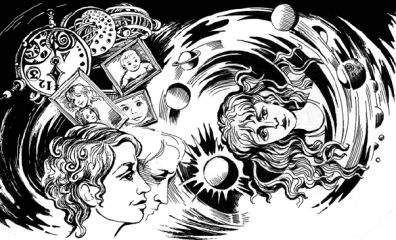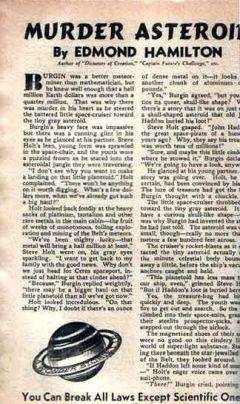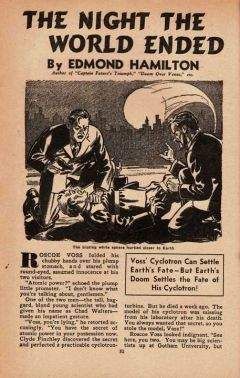Somerset Maugham - Sixty-Five Short Stories

Скачивание начинается... Если скачивание не началось автоматически, пожалуйста нажмите на эту ссылку.
Жалоба
Напишите нам, и мы в срочном порядке примем меры.
Описание книги "Sixty-Five Short Stories"
Описание и краткое содержание "Sixty-Five Short Stories" читать бесплатно онлайн.
65 Short Stories
INTRODUCTION
William Somerset Maugham was born in 1874 and educated at the King's School, Canterbury and Heidelberg University. He spent some time at St Thomas's Hospital as a medical student but was attracted from medicine to letters by the success of his first novel, Liza of Lambeth (1897), in which he drew on what he had seen in the district served by his hospital. He also drew on his medical experience in his first masterpiece, Of Human Bondage (1915). Upon the appearance of The Moon and Sixpence(1919) his reputation as a novelist was established. He was at the same time a successful playwright, his last play, Sheppey, appearing in 1933. Apart from short stones, his work included essays, criticism, autobiography and travel books.
A widely travelled man, he spent much of the 1914-18 war abroad in the intelligence service-the time in which he laid the basis of the Ashenden' stories. In the 'twenties he took up residence in the south of France and, but for the last war, lived there until his death in December 1965.
The stories published here were largely written in the three decades following the First World War. Although Maugham had written short stories early in his career, preoccupation with his other writing led to a long interval before he next took up the form, on a voyage in the South Seas in 1919, originally as a relief from other work. It is consequently an irony which he would have appreciated that many consider him to be at his best in his short stories. When he stopped writing them he made a collection of those that he wished to preserve and arranged them in the order felt to be most agreeable to the reader. This edition as far as possible preserves that arrangement.
A good part of the success of his stories derives from the technique that Maugham used. He discussed this in the preface to the first American edition
of his collected short stories and compared it with the contrasting techniques of Chekhov and de Maupassant. Chekhov had markedly superior characterisation, he said, but de Maupassant did give his short stories a beginning, a middle and an end-which Maugham approved, and which is the key to his style: 'My prepossessions in the arts are on the side of law and order. I like a story that fits.' Such was his answer to critics who had applied the word 'competent' to his stories, disparagingly as they thought-and, judging by the stories' vast and continuing popularity, unwisely.
Following this principle, Maugham developed a style which was as ordered as his general plan. His sentences are short. They balance one another and are balanced in themselves. They are a highly appropriate form for his narratives, stamped as they are by their fluency and discursiveness. Moreover, it is a style equally suited to Maugham's view of his characters: a view that is largely detached, cool, at times slightly cynical but tempered constantly by a wry sense of humour-as illustrated by 'Jane'. Maugham is, however, at ease equally in pure comedy ('The Facts of Life') and in high tragedy ('The Unconquered'). His stories are with the same felicity as varied in mood as they are in setting.
Each of these stories can stand on its own. Maugham himself wrote that such a compactness of technique, character and incident may seem disconcerting in a world where at least one loose end is normally left behind; but the compactness is part of the method used by such short story writers as Maugham. As he put it in his own distinctive way, such a writer 'seeks to prove nothing. He paints a picture and sets it before you. You can take it or leave it.' Most take it.
Rain
It was nearly bed-time and when they awoke next morning land would be in sight. Dr Macphail lit his pipe and, leaning over the rail, searched the heavens for the Southern Cross. After two years at the front and a wound that had taken longer to heal than it should, he was glad to settle down quietly at Apia for twelve months at least, and he felt already better for the journey. Since some of the passengers were leaving the ship next day at Pago-Pago they had had a little dance that evening and in his ears hammered still the harsh notes of the mechanical piano. But the deck was quiet at last. A little way off he saw his wife in a long chair talking with the Davidsons, and he strolled over to her. When he sat down under the light and took off his hat you saw that he had very red hair, with a bald patch on the crown, and the red, freckled skin which accompanies red hair; he was a man of forty, thin, with a pinched face, precise and rather pedantic; and he spoke with a Scots accent in a very low, quiet voice.
Between the Macphails and the Davidsons, who were missionaries, there had arisen the intimacy of shipboard, which is due to propinquity rather than to any community of taste. Their chief tie was the disapproval they shared of the men who spent their days and nights in the smoking-room playing poker or bridge and drinking. Mrs Macphail was not a little flattered to think that she and her husband were the only people on board with whom the Davidsons were willing to associate, and even the doctor, shy but no fool, half unconsciously acknowledged the compliment. It was only because he was of an argumentative mind that in their cabin at night he permitted himself to carp.
'Mrs Davidson was saying she didn't know how they'd have got through the journey if it hadn't been for us,' said Mrs Macphail as she neatly brushed out her transformation. 'She said we were really the only people on the ship they cared to know.'
'I shouldn't have thought a missionary was such a big bug that he could afford to put on frills.'
'It's not frills. I quite understand what she means. It wouldn't have been very nice for the Davidsons to have to mix with all that rough lot in the smoking-room.'
'The founder of their religion wasn't so exclusive,' said Dr Macphail with a chuckle.
'I've asked you over and over again not to joke about religion,' answered his wife. 'I shouldn't like to have a nature like yours, Alec. You never look for the best in people.'
He gave her a sidelong glance with his pale, blue eyes, but did not reply. After many years of married life he had learned that it was more conducive to peace to leave his wife with the last word. He was undressed before she was, and climbing into the upper bunk he settled down to read himself to sleep.
When he came on deck next morning they were close to land. He looked at it with greedy eyes. There was a thin strip of silver beach rising quickly to hills covered to the top with luxuriant vegetation. The coconut trees, thick and green, came nearly to the water's edge, and among them you saw the grass houses of the Samoans; and here and there, gleaming white, a little church. Mrs Davidson came and stood beside him. She was dressed in black and wore round her neck a gold chain, from which dangled a small cross. She was a little woman, with brown, dull hair very elaborately arranged, and she had prominent blue eyes behind invisible pince-nez. Her face was long, like a sheep's, but she gave no impression of foolishness, rather of extreme alertness; she had the quick movements of a bird. The most remarkable thing about her was her voice, high, metallic, and without inflexion; it fell on the ear with a hard monotony, irritating to the nerves like the pitiless clamour of the pneumatic drill.
'This must seem like home to you,' said Dr Macphail, with his thin, difficult smile.
'Ours are low islands, you know, not like these. Coral. These are volcanic. We've got another ten days' journey to reach them.'
'In these parts that's almost like being in the next street at home,' said Dr Macphail facetiously.
'Well, that's rather an exaggerated way of putting it, but one does look at distances differently in the South Seas. So far you're right.'
Dr Macphail sighed faintly.
'I'm glad we're not stationed here,' she went on. 'They say this is a terribly difficult place to work in. The steamers' touching makes the people unsettled; and then there's the naval station; that's bad for the natives. In our district we don't have difficulties like that to contend with. There are one or two traders, of course, but we take care to make them behave, and if they don't we make the place so hot for them they're glad to go.'
Fixing the glasses on her nose she looked at the green island with a ruthless stare.
'It's almost a hopeless task for the missionaries here. I can never be sufficiently thankful to God that we are at least spared that.'
Davidson's district consisted of a group of islands to the North of Samoa; they were widely separated and he had frequently to go long distances by canoe. At these times his wife remained at their headquarters and managed the mission. Dr Macphail felt his heart sink when he considered the efficiency with which she certainly managed it. She spoke of the depravity of the natives in a voice which nothing could hush, but with a vehemently unctuous horror. Her sense of delicacy was singular. Early in their acquaintance she had said to him:
'You know, their marriage customs when we first settled in the islands were so shocking that I couldn't possibly describe them to you. But I'll tell Mrs Macphail and she'll tell you.'
Then he had seen his wife and Mrs Davidson, their deck-chairs close together, in earnest conversation for about two hours. As he walked past them backwards and forwards for the sake of exercise, he had heard Mrs Davidson's agitated whisper, like the distant flow of a mountain torrent, and he saw by his wife's open mouth and pale face that she was enjoying an alarming experience. At night in their cabin she repeated to him with bated breath all she had heard.
'Well, what did I say to you?' cried Mrs Davidson, exultant next morning. 'Did you ever hear anything more dreadful? You don't wonder that I couldn't tell you myself, do you? Even though you are a doctor.'
Mrs Davidson scanned his face. She had a dramatic eagerness to see that she had achieved the desired effect.
'Can you wonder that when we first went there our hearts sank? You'll hardly believe me when I tell you it was impossible to find a single good girl in any of the villages.'
She used the word good in a severely technical manner.
'Mr Davidson and I talked it over, and we made up our minds the first thing to do was to put down the dancing. The natives were crazy about dancing.'
'I was not averse to it myself when I was a young man,' said Dr Macphail.
'I guessed as much when I heard you ask Mrs Macphail to have a turn with you last night. I don't think there's any real harm if a man dances with his wife, but I was relieved that she wouldn't. Under the circumstances I thought it better that we should keep ourselves to ourselves.'
'Under what circumstances?'
Mrs Davidson gave him a quick look through her pince-nez, but did not answer his question.
'But among white people it's not quite the same,' she went on, 'though I must say I agree with Mr Davidson, who says he can't understand how a husband can stand by and see his wife in another man's arms, and as far as I'm concerned I've never danced a step since I married. But the native dancing is quite another matter. It's not only immoral in itself, but it distinctly leads to immorality. However, I'm thankful to God that we stamped it out, and I don't think I'm wrong in saying that no one has danced in our district for eight years.'
But now they came to the mouth of the harbour and Mrs Macphail joined them. The ship turned sharply and steamed slowly in. It was a great landlocked harbour big enough to hold a fleet of battleships; and all around it rose, high and steep, the green hills. Near the entrance, getting such breeze as blew from the sea, stood the governor's house in a garden. The Stars and Stripes dangled languidly from a flagstaff. They passed two or three trim bungalows, and a tennis court, and then they came to the quay with its warehouses. Mrs Davidson pointed out the schooner, moored two or three hundred yards from the side, which was to take them to Apia. There was a crowd of eager, noisy, and good-humoured natives come from all parts of the island, some from curiosity, others to barter with the travellers on their way to Sydney; and they brought pineapples and huge bunches of bananas, tapa cloths, necklaces of shells or sharks' teeth, kava-bowls, and models of war canoes. American sailors, neat and trim, clean-shaven and frank of face, sauntered among them, and there was a little group of officials. While their luggage was being landed the Macphails and Mrs Davidson watched the crowd. Dr Macphail looked at the yaws from which most of the children and the young boys seemed to suffer, disfiguring sores like torpid ulcers, and his professional eyes glistened when he saw for the first time in his experience cases of elephantiasis, men going about with a huge, heavy arm or dragging along a grossly disfigured leg. Men and women wore the lava-lava.
'It's a very indecent costume,' said Mrs Davidson. 'Mr Davidson thinks it should be prohibited by law. How can you expect people to be moral when they wear nothing but a strip of red cotton round their loins?'
'It's suitable enough to the climate,' said the doctor, wiping the sweat off his head.
Now that they were on land the heat, though it Was so early in the morning, was already oppressive. Closed in by its hills, not a breath of air came in to Pago-Pago.
'In our islands,' Mrs Davidson went on in her high-pitched tones, 'we've practically eradicated the lava-lava. A few old men still continue to wear it, but that's all. The women have all taken to the Mother Hubbard, and the men wear trousers and singlets. At the beginning of our stay Mr Davidson said in one of his reports: the inhabitants of these islands will never be thoroughly Christianized till every boy of more than ten years is made to wear a pair of trousers.'
But Mrs Davidson had given two or three of her birdlike glances at heavy grey clouds that came floating over the mouth of the harbour. A few drops began to fall.
'We'd better take shelter,' she said.
They made their way with all the crowd to a great shed of corrugated iron, and the rain began to fall in torrents. They stood there for some time and then were joined by Mr Davidson. He had been polite enough to the Macp hails during the journey, but he had not his wife's sociability, and had spent much of his time reading. He was a silent, rather sullen man, and you felt that his affability was a duty that he imposed upon himself Christianly; he was by nature reserved and even morose. His appearance was singular. He was very tall and thin, with long limbs loosely jointed; hollow cheeks, and curiously high cheek-bones; he had so cadaverous an air that it surprised you to notice how full and sensual were his lips. He wore his hair very long. His dark eyes, set deep in their sockets, were large and tragic; and his hands with their big, long fingers, were finely shaped; they gave him a look of great strength. But the most striking thing about him was the feeling he gave you of suppressed fire. It was impressive and vaguely troubling. He was not a man with whom any intimacy was possible.
He brought now unwelcome news. There was an epidemic of measles, a serious and often fatal disease among the Kanakas, on the island, and a case had developed among the crew of the schooner which was to take them on their journey. The sick man had been brought ashore and put in hospital on the quarantine station, but telegraphic instructions had been sent from Apia to say that the schooner would not be allowed to enter the harbour till it was certain no other member of the crew was affected.
Подписывайтесь на наши страницы в социальных сетях.
Будьте в курсе последних книжных новинок, комментируйте, обсуждайте. Мы ждём Вас!
Похожие книги на "Sixty-Five Short Stories"
Книги похожие на "Sixty-Five Short Stories" читать онлайн или скачать бесплатно полные версии.
Мы рекомендуем Вам зарегистрироваться либо войти на сайт под своим именем.
Отзывы о "Somerset Maugham - Sixty-Five Short Stories"
Отзывы читателей о книге "Sixty-Five Short Stories", комментарии и мнения людей о произведении.














